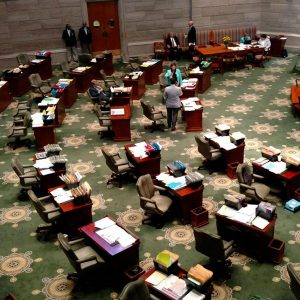An AU-StLouis Board Member Writes About SB323
 (Sponsor of this bill is [D]Senator Karla May)
(Sponsor of this bill is [D]Senator Karla May)
Dear Senator:
As an ordained Baptist Minister and an Attorney, I share my thoughts with the Education Committee in opposition to Senate Bill 323. Even under the guise of being an “elective” course this legislation presents a variety of problems. To start with the bill is clearly drafted from a “Christian” perspective. It does not originate from a perspective of “religious neutrality” and therefore fails to be accommodating of “diverse religious views, traditions, and perspectives of students” in public schools. This being the language provided in the bill. Furthermore, it appears the basis for the legislation is an ill-conceived and erroneous concept that American culture somehow flows from a Christian evangelical or fundamentalist biblical worldview.
The bill erroneously refers to the “Hebrew Scriptures” as the “Old Testament of the Bible.” A clear and exclusively “Christian” designation. The Hebrew Scriptures, i.e., Jewish Bible, has a name. It is not the “Old Testament”, only we Christians use that term. The Hebrew Scriptures are the Tanakh. This Christian labeling of these Scriptures provides the clear indication that the “elective” course is intended as one presented from a Christian, not a neutral perspective.
One must reasonably question how many social studies teachers (if any) possess the requisite education and training in Hebrew or Christian Scriptures to lead a class intended to instruct in “biblical content, characters, poetry, and narratives.” The couching of these concepts under the claim of being “prerequisites to understanding contemporary society and culture”, begs the question why such a course would only be an elective? It is difficult to see how that writings from 2,000 to 4,000 or more years ago from ancient middle eastern cultures provide a basis for understanding 21st Century American “literature, art, music, mores, oratory and public policy.”
As Biblical scholars understand, any attempt to study the content, characters, poetry, and narratives of the Christian Bible or the Tanakh, absent an understanding of the religious underpinnings of these aspects, is simply not good scholarship and instruction, and hardly qualifies as worth the time expended in such an effort.
All the suggested purposes for this legislation have been addressed throughout our nation’s history by the simple means of Jewish and Christian congregations through worship and the study of their respective scriptures. This continues to be the case, as week after week, synagogues, temples, and churches provide worship and learning opportunities for any who are interested. The legislation is quite simply an attempt under the subterfuge of authorizing an “elective” high school social studies course to move Christian faith, doctrine and teachings from the local church building into the public school. It is unnecessary, as there is virtually not a community in our state where interested high school students can not find a local Christian congregation to receive instruction in the Bible. Furthermore, the multitude of Internet sites from which students may research all aspects of Biblical teachings goes beyond the thousands.
For many of us who are people of faith, reducing the Christian Bible to simply a social studies class is demeaning not only to the Bible, but also to observant Christians.
I suggest there are much more important educational issues before the Missouri General Assembly in 2021, than attempting to turn public school class rooms into Sunday School classes. Christian religious instruction can and should be left to local churches, not to local public schools.
